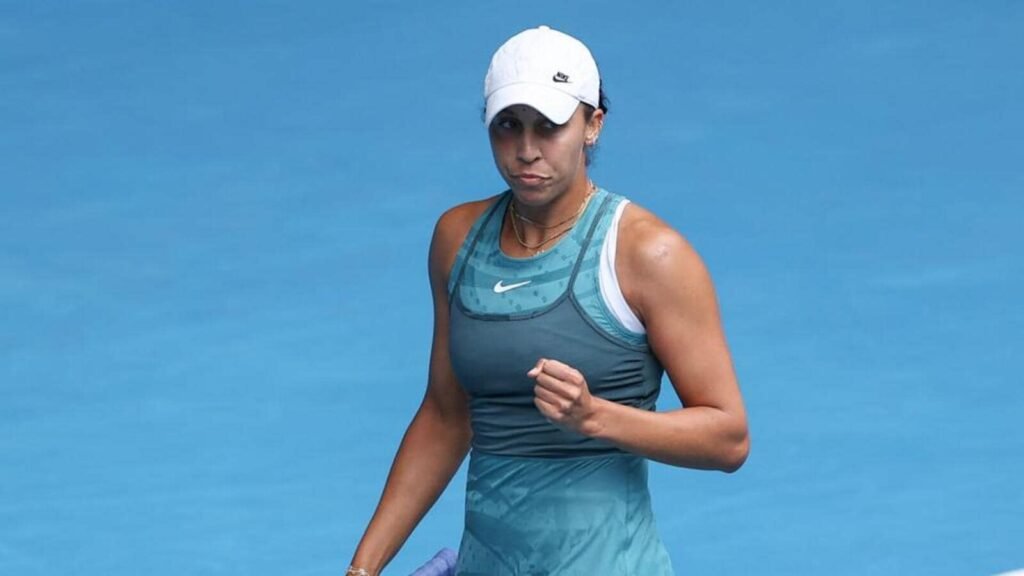
Mumbai: A few times through her professional career that began in 2009, a thought — more a question, really — would leave Madison Keys feeling a bit paralyzed on court: “If it didn’t happen right now, would it ever happen?”

Moments after the 2023 US Open semi-final where she was up 6-0, 5-3 before a sensational turnaround by Aryna Sabalenka, Keys broke down and wept in her press conference. Perhaps that thought seeped in again for a player now in her late twenties: would it ever happen again?
It has, at the 2025 Australian Open. A full decade after it first did.
The American is back in the semi-final at Melbourne Park, rallying to defeat Ukraine’s Elina Svitolina 3-6, 6-3, 6-4 on Wednesday. Her 2015 quarter-final victory also happened to be a three-setter, against Venus Williams. She takes on a red-hot Iga Swiatek now. She ran into a red-hot Serena Williams then.
A couple of generations of American women have swept world tennis, and Keys, 29, has been a constant. She stood witness to Venus and Serena kissing greatness. She stands witness to Coco Gauff rising from teen sensation to Grand Slam champion.
She has seen it all herself, except having a Slam next to her name. Keys celebrated her 14th birthday by turning professional and in the after-party a few months later, became the youngest woman since Martina Hingis to win a WTA level match. She broke into the world’s top 50 rankings at just 17, and was still a teen when she stitched that semi-final run at the 2015 Australian Open. Big things were expected from this American flaunting big weapons.
In the next 10 Slams after the Melbourne breakthrough, Keys had one quarter-final (2015 Wimbledon) to show. She would come within touching distance of breaking open that Slam door by reaching the final of the 2017 US Open, only for an unseeded Sloane Stephens to spring out of nowhere and sneak in instead. Between then and now, Keys made four more semi-finals — including one more in Australia in 2022 — and stopped there. That question, invariably, would start playing in her mind.
“There have been periods in my career where I felt like if I didn’t win one (Slam), I hadn’t done enough,” Keys said after her win on Wednesday. “That took a lot of the fun out of the game.”
That’s one thing this 29-year-old semi-finalist would like to tell that 19-year-old semi-finalist.
“If I could go back, I would just say try to enjoy it a little bit more, and not put as much pressure on yourself. That it had to be right now,” Keys said. “I think I’m getting to a point where I’m starting to appreciate my career for what it has been, and it doesn’t have to have a Grand Slam in order for me to look back and say I’ve done a good job and left everything out there.”
It’s a career defined by consistency, even if not major titles, over a decade. From 2015 to 2021, Keys has ended every season ranked inside the top 20. She touched her career high of world No.7 in 2016, when she was the youngest player in the top 20. She has won nine WTA titles, the first coming in 2014 and the most recent this month in Adelaide. Among the last four women standing in Melbourne, she has the highest number of Slam wins (114).
“Starting as young as I did, I don’t know if I would’ve had the full awareness that I was going to be here 16 years later. But I think it’s a really great era of tennis right now, because you can still be playing some of your best tennis as 30 is approaching, and even past that,” she said.
Keys sure is playing some of her best tennis right now in Australia, having knocked out 10th seed Danielle Collins, 6th seed Elena Rybakina and Svitolina. Out of the 90 points she won on Wednesday, 49 were winners. Svitolina’s count was less than half, and so were her unforced errors. That’s the kind of big game, complemented by a lethal serve, that Keys brings to the table. She lives by it and can also die by it, yet it is what may keep her contest with a rampaging Swiatek lively on Thursday. As Keys put it, “you’re not trying to out-defend Iga”. She may have lost four matches against the Pole, but is among the few women on the tour to have beaten her (in 2022 Cincinnati).
“She’s a good server, returner, moves incredibly well,” Keys said of Swiatek who brushed aside Emma Navarro 6-1, 6-2 on Wednesday and has dropped seven games in her last four outings. “The biggest thing that makes her so difficult to beat is because since she moves so well, if you miss your spot just slightly, she has enough time to recover. And then the point goes back to neutral.”







